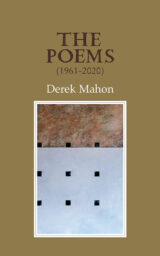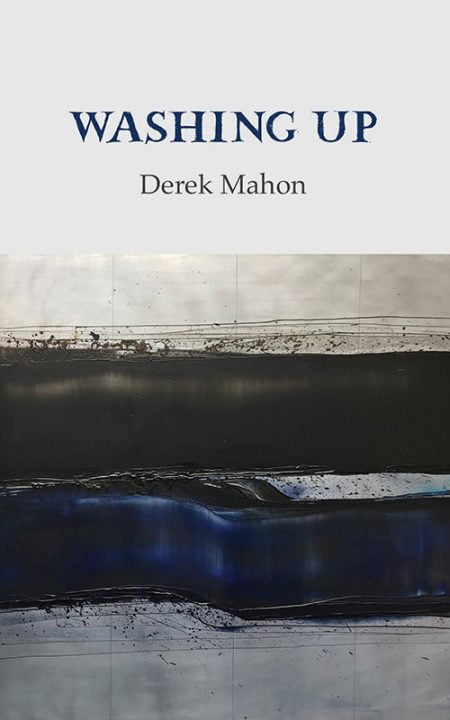
Autumn Skies: Writers on poems by Derek Mahon.
Thirty writers selected a poem by Derek Mahon and provide an essay on their choice.
Edited by Peter Fallon
John Banville l Sara Berkeley l Ciaran Berry Rosita Boland l Gerald Dawe l Seamus Deane Peter Fallon l John FitzGerald l Tom French Eamon Grennan l Vona Groarke l Andrew Jamison Seán Lysaght l Aifric Mac Aodha l John McAuliffe Thomas McCarthy l Medbh McGuckian Frank McGuinness l Audrey Molloy l Paul Muldoon Caitríona Ní Chléirchín l Eiléan Ní Chuilleanáin Annemarie Ní Churreáin l Ailbhe Ní Ghearbhuigh Bernard O’Donoghue l Michelle O’Sullivan l Peter Sirr Gerard Smyth l Colm Tóibín l Grace Wilentz
'Autumn Skies, a collection of 30 brief essays by 30 writers responding to a chosen Mahon poem, was originally intended to celebrate the occasion of the poet’s 80th birthday, but serves now as a memorial tribute. With the poems reprinted alongside the essays, the book acts as an excellent introduction to Mahon’s work, surveying both classic poems (“Afterlives”, “A Disused Shed in Co Wexford”, “Harbour Lights”) and lesser known works. Some of the essays (such as John Fitzgerald on “The Sea in Winter”) admit to a fondness for earlier versions of poems that Mahon later revised, testifying to the arresting power of the first encounter.' — Seán Hewitt, The Irish Times
Derek Mahon, The Poems, 1961-2020; and Autumn Skies: Writers on Poems by Derek Mahon
Memorial tribute
. . . Autumn Skies, a collection of 30 brief essays by 30 writers responding to a chosen Mahon poem, was originally intended to celebrate the occasion of the poet’s 80th birthday, but serves now as a memorial tribute.
With the poems reprinted alongside the essays, the book acts as an excellent introduction to Mahon’s work, surveying both classic poems (‘Afterlives’, ‘A Disused Shed in Co Wexford’, ‘Harbour Lights’) and lesser known works. Some of the essays (such as John Fitzgerald on ‘The Sea in Winter’) admit to a fondness for earlier versions of poems that Mahon later revised, testifying to the arresting power of the first encounter.
It is rare for a poet to be able to write a poem such as ‘Penshurst Place’, with its sumptuous traditionalism, its lilting rhythms and ornate atmosphere, its descriptions of
rich silence after rain,
lute music in the orchard aisles,
the paths ablaze with daffodils,
to be able to write of courtiers and turtle doves, and then to also, elsewhere, draw the reader into a bitter, disillusioned complicitly, as in ‘Afterlives’, with its famous (and, after Mahon’s revision, somewhat neutered) exclamation, ‘What middle-class shits we are’.
What is rarer is to be able to pull off both these registers within a few pages and still remain recognisably oneself, but Mahon does this with apparent ease. It is this varied and exacting idiom that draws the reader close to Mahon. Like many of us in real life, he can be both blisteringly angry, exasperated, tender, genuinely funny, lyrical, political, romantic, and apocalyptic. Unlike most of us, he can do this within a poem too.
Mahon crafts a language, as Vona Groarke writes, that ‘shimmies between instruction and evocation’, a poetry that can be what Andrew Jamison calls ‘lamentation, lambasting and love poem all at once’. Autumn Skies is full of such pithy and perceptive descriptions.
Ironies
Not only this, but it is particularly good to see Paul Muldoon pointing to the ironies and dissatisfactions of a poem that thronged social media last year, Mahon’s ‘Everything Is Going to Be Alright’.
Enlisted as a saccharine and zen anthem of the pandemic (during which everything was, demonstrably, not alright), the poem’s repeated ‘There will be dying, there will be dying’ seemed oddly dismissive or unfeeling. Read by Muldoon as a lyric of ‘absentminded desperation rather than conviction’, the poem is recovered as ambivalent, hesitant, doubtful and failing, and is all the better for it.
As a poet, right through to his final collection, of complex and committed environmental and social politics, with the formal range and grace of the finest practitioners of the art, Mahon’s departure leaves us with a sense of aftermath. Perhaps that is fitting . . . In Mahon’s poetry, we have been left a lasting, rich and challenging legacy.
— Seán Hewitt, The Irish Times
Publication Date: 23 November 2021
Details: 156pp
ISBN PBK: 978 1 91133 806 2
ISBN HBK: 978 1 91133 807 9
Cover: Photographs by Suella Holland




